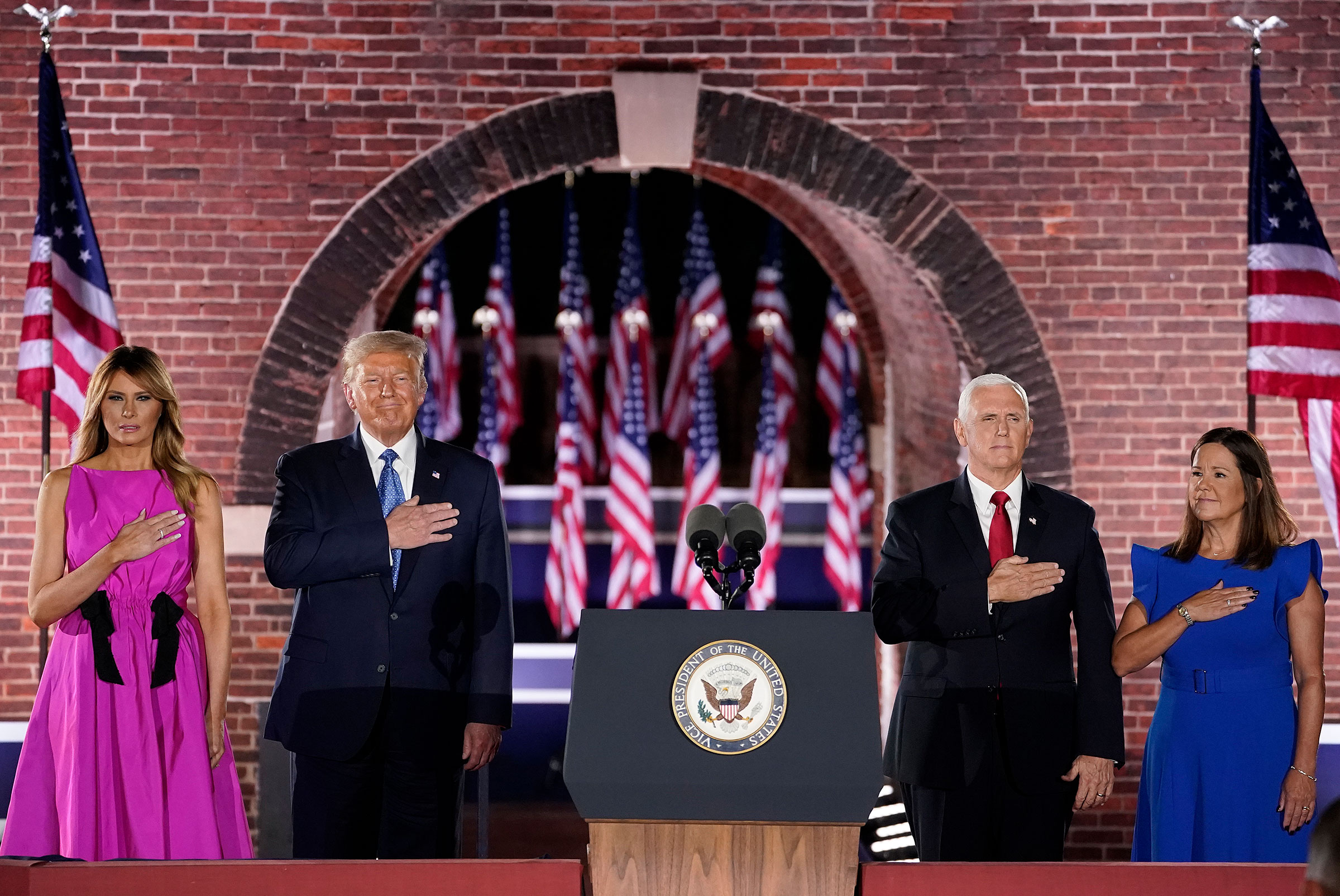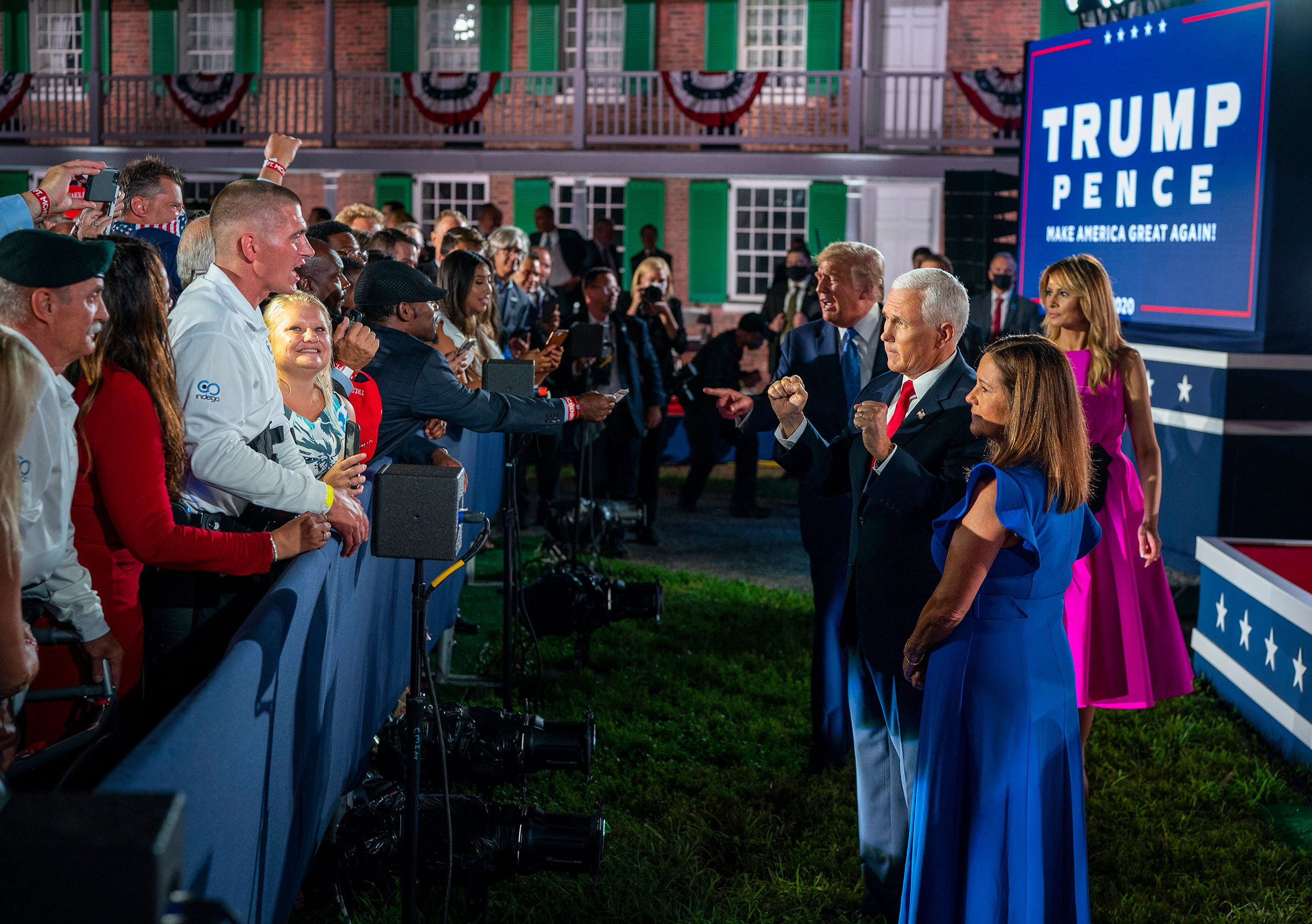
Listening to the speakers at the Republican National Convention, you might be forgiven for thinking that the coronavirus pandemic is over.
Many have largely ignored the virus that has killed nearly 180,000 Americans, despite the fact that it continues to seriously disrupt life in the United States, including their own event. Others, like White House economic adviser Larry Kudlow, referred to the pandemic in the past tense: “It was awful,” Kudlow said on August 25. “Health and economic impacts were tragic. Hardship and heartbreak were everywhere. But presidential leadership came swiftly and effectively with an extraordinary rescue for health and safety to successfully fight the COVID virus.”
When Vice President Mike Pence took the stage Wednesday night, his speech was a striking example of the Trump Administration’s attempts to reframe the history of the pandemic that has claimed hundreds of thousands of lives worldwide and nearly ground the American economy to a halt. “Thanks to the courage and compassion of the American people, we are slowing the spread, we are protecting the vulnerable, and we are saving lives, and we are opening up American again,” Pence said, speaking at Fort McHenry in Baltimore, MD. “Because of the strong foundation that President Trump poured in our first three years, we’ve already gained back 9.3 million jobs in the last three months alone.”

Pence was named chair of the White House coronavirus task force in late February. Experts point to the failure to set up a speedy and functional testing and tracing system, the inconsistent guidance coming from the White House on mask-wearing and other crucial mitigation measures, and the early push to reopen states as costly missteps in the Trump Administration’s response to the virus. In August, more than six months after COVID-19 began sweeping through the U.S., the country continues to lead the world in confirmed cases of COVID-19 and number of deaths. Americans have experienced unemployment rates unseen since the Great Depression. The U.S. will almost certainly surpass 200,000 deaths from the virus before the election. Until a vaccine is approved, testing delays are hampering reopening throughout the country.
For the Trump Administration, it’s a dire situation just over two months before Election Day. According to polls tracked by FiveThirtyEight, 58.2% of Americans disapprove of Donald Trump’s coronavirus response, compared to 38.7% who approve, and that disapproval has been steadily rising since the U.S. surpassed 10,000 deaths in April.
Make sense of what matters in Washington. Sign up for the daily D.C. Brief newsletter.
Most of the political speakers Wednesday night avoided talking about the pandemic entirely. Neither senior White House aide Kellyanne Conway nor Second Lady Karen Pence mentioned COVID-19 explicitly; both made only an oblique reference to “everyday” American “heroes” including healthcare workers, teachers and frontline workers. Rep. Elise Stefanik from New York didn’t mention the virus, but said Trump is “working to safely re-open our Main Street economy” while Democratic challenger Joe Biden would keep business owners and workers “locked up in the basement.”
Rep. Lee Zeldin from New York was the sole speaker in Wednesday’s lineup to devote the entirety of his remarks to the Trump Administration’s response to the pandemic. Zeldin praised Trump and described being on the phone late at night with senior adviser Jared Kushner to get needed personal protective equipment (PPE) to his district— nearly 1.2 million items of PPE in one month, according to Zeldin, including masks and gowns. “During a once-in-a-century pandemic— an unforeseeable crisis sent to us from a faraway land— the President’s effort for New York was phenomenal,” Zeldin said.
The alternative history spun out during the convention portrays COVID-19 as an unpredictable lightning strike sent from China against a U.S. left unprepared by the previous administration. But Trump had already been in office for three years when the pandemic washed ashore—mostly through Europe—and Trump’s White House had stripped away an office for pandemic response and ignored plans developed after the 2014 Ebola outbreak. More damaging, Trump repeatedly downplayed the seriousness of the virus as it spread in American cities through the spring, and when the Centers for Disease Control and Prevention recommended Americans cover their faces in April, Trump said he himself would not.
During his speech to end the night, Pence heralded the administration’s work fighting the virus. Pence said Trump’s decision to halt travel from China saved “untold” numbers of American lives. He said the federal government was able to “launch the greatest national mobilization since World War II” and “forge seamless partnerships with governors across America in both political parties.” And he offered a hopeful prediction: “America is a nation of miracles,” the Vice President said, “and I’m proud to report that we’re on track to have the world’s first safe, effective coronavirus vaccine by the end of this year.”
The determination to move past the harsh realities of COVID-19 is contradicted by the format of the convention itself: as speakers talk about the virus in the past tense, or announce that it has been successfully subdued, they have been speaking in pre-taped videos, to empty rooms or in outdoor spaces, because it remains unsafe to gather large groups of people inside.
When Trump has spoken about COVID-19 this week, he called it the “China virus” and “the plague,” and talked about it as an external force over which he had little control on influence. During a 53-minute rambling speech to 336 GOP delegates gathered in a hotel ballroom in Charlotte, North Carolina, on the opening day of the convention, Trump called for some magical thinking: “But think of your life just prior to the plague coming in. It was the best it’s ever been.”
He promised to deliver a “super V” shaped recovery. He described his administration’s response as “incredible,” while at the same time shunting responsibility onto others, saying many governors were “totally ill-prepared” and that the virus response should be run by the states and the “governors are supposed to do it.” He blamed earlier administrations for not having prepared, saying the “cupboards were bare” of supplies, and promised that Americans will “soon see vaccines pouring out years ahead.” (Earlier this month, Trump said a vaccine approved before Nov. 3 “wouldn’t hurt” his reelection chances.)
Even when the moment calls for it, Trump slides past the destruction the virus has brought to millions of American lives. Later on Monday, as the GOP convention kicked off, Trump visited a farm distribution facility near Asheville, N.C. that has packed boxes of food for delivery to families in need during the pandemic, but he didn’t meet with any of those families on that trip. The same night, a taped segment of Trump standing stiffly in the East Room, talking at a six-foot distance with two nurses, two law enforcement officers who had recovered from COVID-19, a trucker and two postal workers impacted by the pandemic, aired as part of the evening convention program. “These are the incredible workers that helped us so much with the COVID,” Trump said. “We can call it many different things from China virus — I don’t want to go through all the names because some people might get insulted because that’s the way it is — these are great great people.”
Trump has rarely spoken to the devastating loss and economic hardship families are feeling right now. His wife and Vice President took on that role during the convention. In her Rose Garden speech Tuesday night, First Lady Melania Trump expressed her “deepest sympathy” for “everyone who has lost a loved one.” And in his speech the following night, Pence said, “In this country, we mourn with those who mourn, and we grieve with those who grieve.”
But as much as Trump and the Republicans who have spoken this week may be ready for America to move on, the pandemic itself is not yet finished with America.
More Must-Reads from TIME
- Donald Trump Is TIME's 2024 Person of the Year
- Why We Chose Trump as Person of the Year
- Is Intermittent Fasting Good or Bad for You?
- The 100 Must-Read Books of 2024
- The 20 Best Christmas TV Episodes
- Column: If Optimism Feels Ridiculous Now, Try Hope
- The Future of Climate Action Is Trade Policy
- Merle Bombardieri Is Helping People Make the Baby Decision
Write to Tessa Berenson Rogers at tessa.Rogers@time.com
